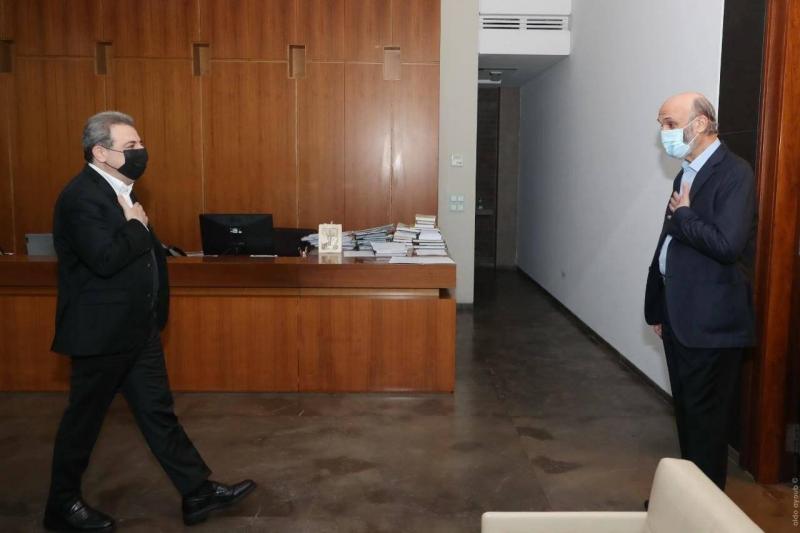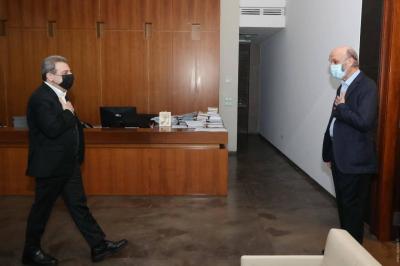The communications between the Progressive Socialist Party and the Lebanese Forces have resulted in an electoral alliance in the Shouf-Aley and Baabda districts in Mount Lebanon. However, this agreement does not extend to all districts in which they are competing in the electoral battle, ending up as a "piecemeal" alliance. They united in Mount Lebanon's districts and separated, even competing in other districts, most notably in Western Bekaa.
MP Wael Abu Faour from the Socialist Party made it clear after his meeting with the head of the Forces, Samir Geagea, a few days ago that "things are progressing in Mount Lebanon regarding the relationship and coordination between the Forces, the Socialist, and other parties. As for the rest of the regions, they have their own considerations which are discussed in their specific contexts."
This announcement was practically reflected in the registration of the lists that bring together the Forces and the Socialist in both the Baabda and Shouf-Aley districts, where the battle is most crucial for the head of the Socialist Party, former MP Walid Jumblatt, against the allies of the Shiite duo (Hezbollah and Amal Movement), namely the Free Patriotic Movement and former ministers Talal Arslan and Wiam Wahhab.
In Western Bekaa, each side has its own battle after the failure to form an alliance. The final touches are being put on the list combining the Socialist through MP Wael Abu Faour with MP Mohammed Al-Qaraawi (who allied with the Future Movement led by Saad Hariri in the previous elections) and the Islamic group, while the Lebanese Forces are still trying, albeit with difficulty, to form a list. In this context, sources from the Forces told Al-Sharq Al-Awsat that the separation in Western Bekaa, as in other regions, came in favor of each party's electoral interest, describing the situation as a "power balance game." Meanwhile, sources from the Socialist view it as "a matter of considering differences," all aimed at serving the existential challenge in the country against the second party represented by "Hezbollah" and the Free Patriotic Movement (supportive of President Michel Aoun), which is attempting to consolidate power.
On the other hand, sources following the electoral negotiations in Western Bekaa confirmed to Al-Sharq Al-Awsat that the failure to ally resulted from Al-Qaraawi's refusal to partner with the Forces and his direction to search for an independent Maronite figure in the area to join the list. The choice fell on Jihad Al-Zarzour, a relative of the Future Movement MP Henry Shehadeh, in addition to candidate Ali Abu Yassine from the Islamic group, Ghassan Skaf (from the Orthodox community), and Abbas Aidi (Shiite).
With reports indicating efforts that reached the level of pressure to withdraw Al-Zarzour and reach a solution that includes a candidate agreeable to both the Forces and the Socialist and Al-Qaraawi, all attempts failed. The Forces sources refuse to discuss details, stating, "What matters is that we and the Socialist are on the same side in the major sovereignty battle. In elections, each party is entitled to seek its own interest," affirming that "the Forces" are working on forming a list in Western Bekaa, with two names already confirmed: Dani Khater and George Aboud. They add, "Al-Qaraawi does not represent all the Sunni community in Western Bekaa, and the Forces also have allies in the region from the Sunnis, and there will be two candidates from them in the list." However, it is noted that it will be challenging for the Forces to form a complete list due to the difficulty of finding candidates from both the Druze and Shiite sects. According to sources, pressure has been exerted by the Shiite duo (Hezbollah and Amal Movement) in the region to exclude a strong Shiite figure from the "Socialist-Al-Qaraawi" list.
Despite the Forces' insistence on forming their list in Western Bekaa, they face challenges in the Sunni street, particularly from those associated with the "Future Movement," who refuse to ally with them. This was clearly shown a couple of days ago when the former coordinator of Future in Western Bekaa withdrew from the list that had joined him with the Forces shortly after its registration in the Ministry of Interior.
The Western Bekaa district, also known as the second Bekaa, includes six seats: two from the Sunni community, one Orthodox, one Maronite, one Druze, and one Shiite. The battle is being fought in addition to the Forces and Al-Qaraawi-Socialist lists against the list supported by the Shiite duo with former minister Hassan Mourad and the Free Patriotic Movement and Deputy Speaker Eli Farzli, in addition to the civil society which announced one of its lists and is expected to announce another in the coming days.
The Socialist and the Forces part ways in other districts where they are competing electorally, as is the case in Tripoli in the north, where they are each on separate lists. The Forces have allied with former minister Ashraf Rifi, while the Socialist chose the list supported by Prime Minister Najib Mikati, through its candidate Afraa Eid, which also includes several names including the son of MP Mohammed Kabbara, Karim, and the son of late MP Jean Obeid and current MP Ali Darwish.
In Beirut II, the Socialist is contesting through MP Faisal Al-Sayegh on the list led by former minister Khaled Qabbani, supported by former Prime Minister Fouad Siniora, while the Forces, which do not have a candidate in the district, chose to support Michel Flah, (the Orthodox seat) who is also a candidate on the same list.




